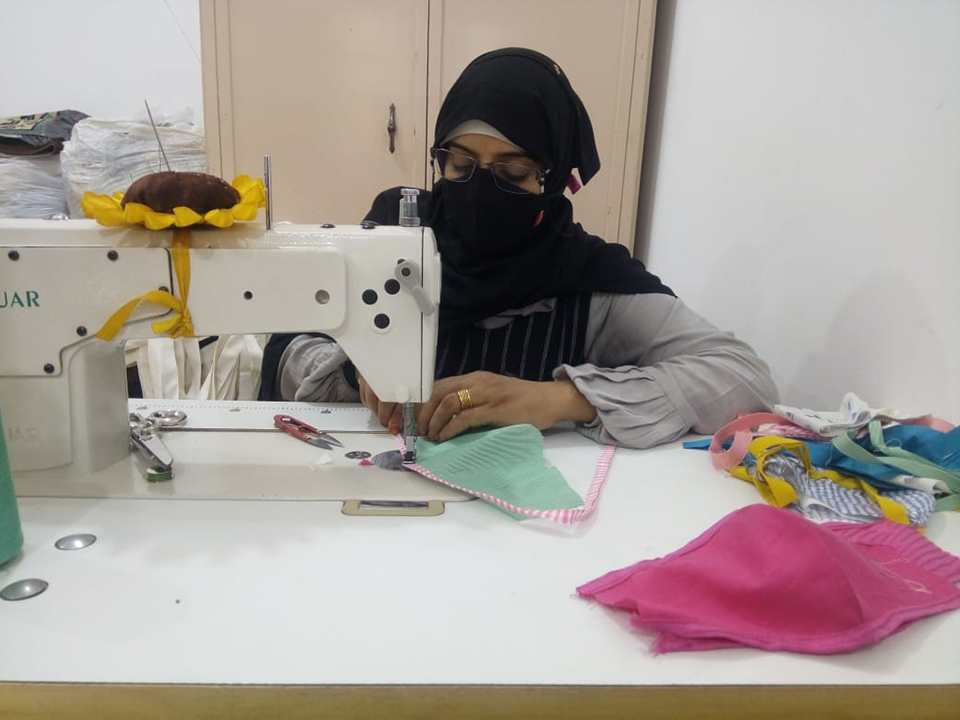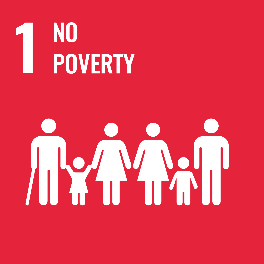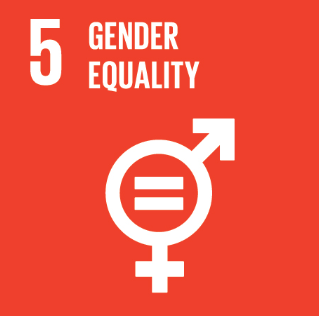From where I stand: “It is a great feeling when you know that you can change your situation to the better and help your loved ones”
Date:
Hayah Mohamed is a 38-year-old Yemeni woman living in Cairo with her husband, their daughter and three sons. She had to stay in Cairo longer than expected and faced economic challenges after she stopped receiving remittances from Yemen due to the ongoing conflict. To support her family, Mohamed joined a sewing course at AlMashgel, a production unit supported by UN Women Egypt, where she gained new skills and was able to start a small home-based business. AlMashgel is operated by UN Women’s partner Thaat, a social enterprise that focuses on training women on handicrafts production to empower them financially and revive traditional crafts from Egypt, Africa and the Middle East.

Hayah Mohamed sews facemasks at AlMashgel. Photo: Courtesy of Thaat.
“I was a psychologist in Yemen, specializing in working with children with special needs. My husband is a university professor and we came to Egypt as part of a scholarship programme so he could continue his postgraduate studies, and so we could improve our family’s future. Everything was great in Egypt until the conflict broke out in Yemen and my husband lost his connection with the scholarship programme and we were not able to receive financial assistance from our extended family. Our financial situation suddenly became very challenging. We had to sell our furniture to put food on the table for the little ones.
I decided not to be passive and look for ways to generate an income with dignity. I asked around in the Yemeni community and I heard about AlMashgel and its skills-training activities through a community member. I applied and decided to join the sewing course. I fell in love with it and the trainers and my peers encouraged me and told me that I am talented. AlMashgel gave me a sewing machine after I graduated from the course and I started sewing clothes for my family and those in the Yemeni community.
Bit by bit, I started to build a network, have my own customers, and generate enough income to support my family. I also worked from home for a small factory in Cairo and I was recently recruited by Thaat. It is a great feeling when you know that you can change your situation to the better and help your loved ones.
The coronavirus has [negatively] impacted the demand on my services, but so far, I am still able to put food on the table. My advice to all my sisters who are facing economic challenges like I did is to never give up and to work on themselves so that they can support themselves and their families with dignity.”

 Hayah Mohamed found her calling through UN Women's "Leadership, Empowerment, Access and Protection" (LEAP) programme, which supports women from refugee and host communities through capacity-building, vocational training and access to financial services. The programme is implemented in partnership with The National Council for Women and UNHCR, and is generously funded by the Government of Japan. Hayah's story reflects the programme's efforts to achieve Sustainable Development Goal (SDG) 1: “End poverty in all its forms everywhere” by contributing to the financial independence of refugees and Egyptian women. The programme also contributes to SDG 5: "Achieve gender equality and empower all women and girls" as it addresses the gendered challenges that these women face in their quest for financial independence.
Hayah Mohamed found her calling through UN Women's "Leadership, Empowerment, Access and Protection" (LEAP) programme, which supports women from refugee and host communities through capacity-building, vocational training and access to financial services. The programme is implemented in partnership with The National Council for Women and UNHCR, and is generously funded by the Government of Japan. Hayah's story reflects the programme's efforts to achieve Sustainable Development Goal (SDG) 1: “End poverty in all its forms everywhere” by contributing to the financial independence of refugees and Egyptian women. The programme also contributes to SDG 5: "Achieve gender equality and empower all women and girls" as it addresses the gendered challenges that these women face in their quest for financial independence.
Read Arabic